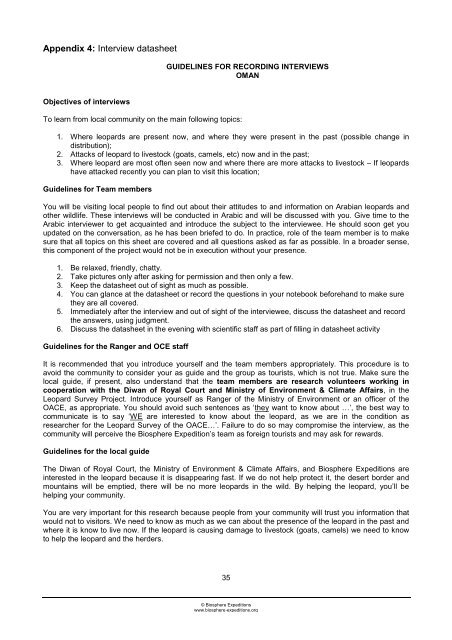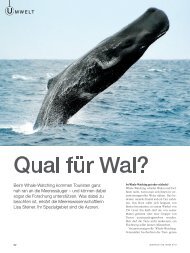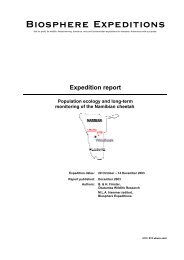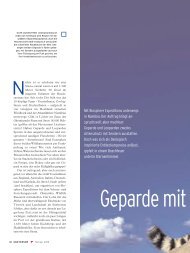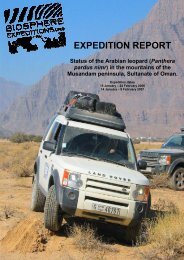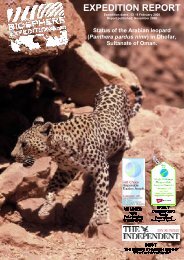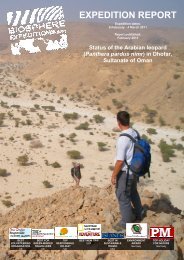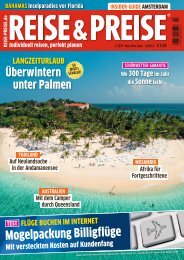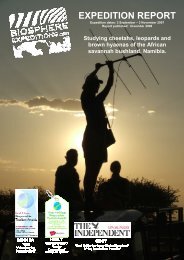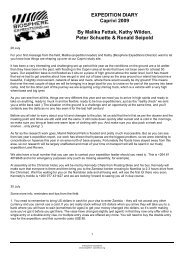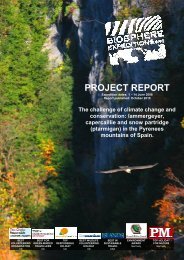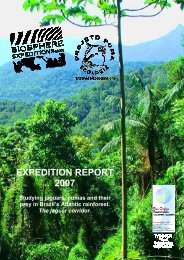EXPEDITION REPORT - Biosphere Expeditions
EXPEDITION REPORT - Biosphere Expeditions
EXPEDITION REPORT - Biosphere Expeditions
Create successful ePaper yourself
Turn your PDF publications into a flip-book with our unique Google optimized e-Paper software.
Appendix 4: Interview datasheet<br />
Objectives of interviews<br />
To learn from local community on the main following topics:<br />
GUIDELINES FOR RECORDING INTERVIEWS<br />
OMAN<br />
1. Where leopards are present now, and where they were present in the past (possible change in<br />
distribution);<br />
2. Attacks of leopard to livestock (goats, camels, etc) now and in the past;<br />
3. Where leopard are most often seen now and where there are more attacks to livestock – If leopards<br />
have attacked recently you can plan to visit this location;<br />
Guidelines for Team members<br />
You will be visiting local people to find out about their attitudes to and information on Arabian leopards and<br />
other wildlife. These interviews will be conducted in Arabic and will be discussed with you. Give time to the<br />
Arabic interviewer to get acquainted and introduce the subject to the interviewee. He should soon get you<br />
updated on the conversation, as he has been briefed to do. In practice, role of the team member is to make<br />
sure that all topics on this sheet are covered and all questions asked as far as possible. In a broader sense,<br />
this component of the project would not be in execution without your presence.<br />
1. Be relaxed, friendly, chatty.<br />
2. Take pictures only after asking for permission and then only a few.<br />
3. Keep the datasheet out of sight as much as possible.<br />
4. You can glance at the datasheet or record the questions in your notebook beforehand to make sure<br />
they are all covered.<br />
5. Immediately after the interview and out of sight of the interviewee, discuss the datasheet and record<br />
the answers, using judgment.<br />
6. Discuss the datasheet in the evening with scientific staff as part of filling in datasheet activity<br />
Guidelines for the Ranger and OCE staff<br />
It is recommended that you introduce yourself and the team members appropriately. This procedure is to<br />
avoid the community to consider your as guide and the group as tourists, which is not true. Make sure the<br />
local guide, if present, also understand that the team members are research volunteers working in<br />
cooperation with the Diwan of Royal Court and Ministry of Environment & Climate Affairs, in the<br />
Leopard Survey Project. Introduce yourself as Ranger of the Ministry of Environment or an officer of the<br />
OACE, as appropriate. You should avoid such sentences as ‘they want to know about …’, the best way to<br />
communicate is to say ‘WE are interested to know about the leopard, as we are in the condition as<br />
researcher for the Leopard Survey of the OACE…’. Failure to do so may compromise the interview, as the<br />
community will perceive the <strong>Biosphere</strong> Expedition’s team as foreign tourists and may ask for rewards.<br />
Guidelines for the local guide<br />
The Diwan of Royal Court, the Ministry of Environment & Climate Affairs, and <strong>Biosphere</strong> <strong>Expeditions</strong> are<br />
interested in the leopard because it is disappearing fast. If we do not help protect it, the desert border and<br />
mountains will be emptied, there will be no more leopards in the wild. By helping the leopard, you’ll be<br />
helping your community.<br />
You are very important for this research because people from your community will trust you information that<br />
would not to visitors. We need to know as much as we can about the presence of the leopard in the past and<br />
where it is know to live now. If the leopard is causing damage to livestock (goats, camels) we need to know<br />
to help the leopard and the herders.<br />
35<br />
© <strong>Biosphere</strong> <strong>Expeditions</strong><br />
www.biosphere-expeditions.org


